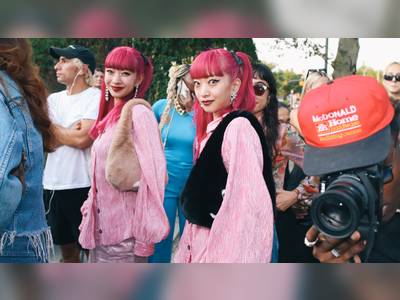The 2008 Spring/Summer Paris Fashion Week held last month showed an increased Asian influence due to the participation of many designers from Asian countries. Japanese and South Korean designers have regularly featured in the event, but this year, designers from India and Thailand made their debut.
Jefen, a Beijing-based fashion house that participated in the Paris Fashion Week for the first time last year, has been attracting much attention.
Jefen's chief designer, Frankie Xie, said the company wanted to take part in the event to raise awareness of China's bountiful fashions, and underline the fact that the country does not just churn out ordinary apparel.
During the Paris Fashion Week--seen as the world's top fashion event--brand-name companies from across the world gather to show off their creativity. The event also greatly influences fashion businesses worldwide.
The reputation of the Paris Fashion Week means each country's fashion and imagery reach people across the globe. As such, the participation of more Asian designers has a significant impact.
Until recently, many Asian countries were generally used as huge sewing factories to carry out work for prestigious Western fashion brands. But along with economic development in these countries, governments and companies have begun to build on their production skills, and now are promoting their own added-value design abilities and fashion brands.
However, Paris Fashion Week is not the only stage for such purposes. Governments and fashion industry associations in many Asian countries, including China, India, Malaysia, Singapore and Thailand, have cooperated to hold large-scale promotion events called Fashion Week, during which fashion shows and textile trade exhibitions are held.
The Asian events aim to provide opportunities for designers to exhibit their work in their own countries. At the same time, the events aim to attract guests, such as foreign media and buyers from department stores, who convey information about each country's fashion to the rest of the world.
In Japan, the government has in recent years recognized the value of the fashion industry. The government's 2007 plan to promote the nation's intellectual property includes the fashion industry as one of Japan's brand-related strategies.
Japan Fashion Week, which started in 2005, is at the core of the nation's fashion brand strategy, and holds a series of large-scale semiannual events in spring and autumn. Events comprise fashion and textile trade shows in which the private sector--led by the Economy, Trade and Industry Ministry and apparel-related industries--jointly promotes Japanese fashion products.
This autumn's JFW ran for eight days through early September. One event that set many tongues wagging was an exhibition by 11 young designers from countries and regions including Japan, Germany, Taiwan, Israel, and Georgia. Many of the designers studied at famous fashion schools in Britain and Belgium.
Interestingly, the young designers chose Tokyo as the venue for their exhibition and visited officials of the ministry and JFW to explain their plan. This was a welcome move for Japan, which is trying to enhance the nation's ability to create and distribute fashion trends to the rest of the world.
In addition to the JFW events, inviting from abroad designers who are interested in Japanese apparel and textile products is crucial. Creating opportunities for them to meet officials and workers in the Japanese fashion industry also can help: Such meetings can lead to the creation of new values, products and trends, as well as increase Japan's status abroad and promote the nation internationally.
Placing more branded Japanese fashion products in duty-free shops at Narita Airport and other international airports also could serve as an effective way to promote Japanese fashion.
JFW events have received financial assistance from the ministry. However, this aid is due to end after the sixth JFW is held in March. From then on, JFW will be converted into a new organization to help beef up its various projects. Currently the ministry and the organizers are discussing details of its future incarnation.
In Italy, the Italian Trade Commission organizes overseas exhibitions to promote the country's products, including an annual event in Japan. Even the world's forerunner in the fashion industry has been working hard to promote its fashion products.
Though JFW events have become more fruitful, Japan still needs to strive to improve the competitive edge of its fashion industry abroad by learning from other countries' activities.













